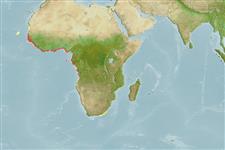Environment: milieu / climate zone / depth range / distribution range
البيئة
بحري; المياه العذبة; مياه مخلوطة; أسماك نازلة (Ref. 46888). Tropical
Eastern Atlantic: West African coast, from the outlet of the River Senegal (Ref. 57400) to Congo, and on the islands of Bioko (Fernando Poo) and Sao Tome (Ref. 81659). Also reported from Mauritania (Ref. 5377).
Length at first maturity / الحجم / وزن / العمر
Maturity: Lm 15.0, range 13 - 24 cm
Max length : 40.0 cm TL ذكر/ مختلط الجنس; (Ref. 2683); common length : 25.0 cm SL ذكر/ مختلط الجنس; (Ref. 7399)
أشعه شرجية لينه: 8 - 9. Diagnosis: 8-9 anal soft rays; anal fin and lower lobe of caudal fin yellowish (Ref. 57400). Scales large, 25-30 (usually 27-29) in a longitudinal series (excluding scales on caudal fin base)(Ref. 57400, 81659), 8-10.5 scale rows between pelvic and first dorsal fins (Ref. 81659). Body with ctenoid scales, except for anterior predorsal scales which are cycloid and extend to anterior nostril or slightly beyond; scales usually with only 1 groove (some predorsal scales with 2 or rarely 3 small grooves); posterior end of maxilla sigmoid, curved down over premaxilla; serrate, anteroventral edge of lachrymal distinctly concave; pharyngobranchial organ with 2 valves, anteroventral valve usually a small, finger-like process, sometimes with fringe of smaller processes or papillae positioned ventrally at base, posterodorsal valve usually a small, squarish flap which is fimbriate, terminating in 2-3 short filaments (Ref. 81659).
Very common in lagoons and estuaries; an extremely euryhaline species (from 0-66‰), but preferring areas close to the sea in estuaries and lagoons (Ref. 57400), often with muddy substrates (Ref. 81659). Inhabits shallow coastal waters, estuaries and brackish lagoons (Ref. 2683), including mangroves (Ref. 2683, 81659), creeks, estuaries, inundated mudflats (Ref. 81659) and freshwater rivers (Ref. 7399). Oviparous, eggs are pelagic and non-adhesive (Ref. 205). Maximum reported size 297 mm FL, but possibly up to 400 mm (Ref. 57400, 81659).
Life cycle and mating behavior
Maturities | التكاثر | Spawnings | Egg(s) | Fecundities | Larvae
Thomson, J.M., 1990. Mugilidae. p. 855-859. In J.C. Quero, J.C. Hureau, C. Karrer, A. Post and L. Saldanha (eds.) Check-list of the fishes of the eastern tropical Atlantic (CLOFETA). JNICT, Lisbon; SEI, Paris; and UNESCO, Paris. Vol. 2. (Ref. 7399)
IUCN Red List Status (Ref. 130435)
استخدامات بشرية
مصائد: تجاري
أدوات
تقارير خاصة
Download XML
مصادر علي الأنترنت
Estimates based on models
Preferred temperature (Ref.
123201): 23.4 - 27.9, mean 26.5 °C (based on 66 cells).
Phylogenetic diversity index (Ref.
82804): PD
50 = 1.0000 [Uniqueness, from 0.5 = low to 2.0 = high].
Bayesian length-weight: a=0.01148 (0.00996 - 0.01324), b=2.95 (2.91 - 2.99), in cm total length, based on LWR estimates for this species (Ref.
93245).
مستوى غذائي (Ref.
69278): 2.0 ±0.0 se; based on diet studies.
Generation time: 5.9 ( na - na) years. Estimated as median ln(3)/K based on 1
growth studies.
المرونه (Ref.
120179): وسيط, الحد الزمني الأدني لتضاعف عدد أفراد المجتمع 1.4-4.4 سنة (Preliminary K or Fecundity.).
Fishing Vulnerability (Ref.
59153): Moderate vulnerability (43 of 100).
Nutrients (Ref.
124155): Calcium = 161 [60, 429] mg/100g; Iron = 1.4 [0.6, 3.0] mg/100g; Protein = 18.2 [16.4, 19.9] %; Omega3 = 0.317 [0.149, 0.698] g/100g; Selenium = 38.4 [16.8, 93.2] μg/100g; VitaminA = 21.1 [5.3, 84.7] μg/100g; Zinc = 2.19 [1.44, 3.38] mg/100g (wet weight);
